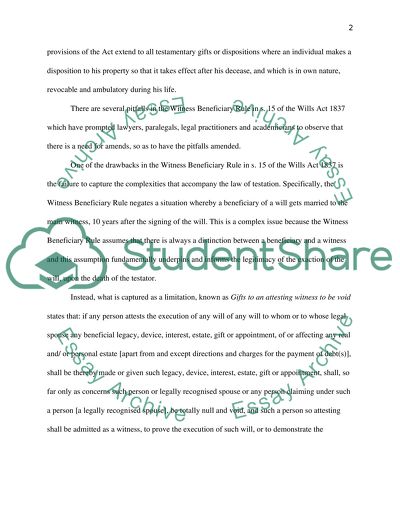Cite this document
(“The witness beneficiary rule in S.15 of the Wills Act 1837 is outdated Essay”, n.d.)
The witness beneficiary rule in S.15 of the Wills Act 1837 is outdated Essay. Retrieved from https://studentshare.org/law/1625269-the-witness-beneficiary-rule-in-s15-of-the-wills-act-1837-is-outdated-and-in-need-of-reformdiscuss-this-statement-with-reference-to-relevant-academic-and-judicial-comment
The witness beneficiary rule in S.15 of the Wills Act 1837 is outdated Essay. Retrieved from https://studentshare.org/law/1625269-the-witness-beneficiary-rule-in-s15-of-the-wills-act-1837-is-outdated-and-in-need-of-reformdiscuss-this-statement-with-reference-to-relevant-academic-and-judicial-comment
(The Witness Beneficiary Rule in S.15 of the Wills Act 1837 Is Outdated Essay)
The Witness Beneficiary Rule in S.15 of the Wills Act 1837 Is Outdated Essay. https://studentshare.org/law/1625269-the-witness-beneficiary-rule-in-s15-of-the-wills-act-1837-is-outdated-and-in-need-of-reformdiscuss-this-statement-with-reference-to-relevant-academic-and-judicial-comment.
The Witness Beneficiary Rule in S.15 of the Wills Act 1837 Is Outdated Essay. https://studentshare.org/law/1625269-the-witness-beneficiary-rule-in-s15-of-the-wills-act-1837-is-outdated-and-in-need-of-reformdiscuss-this-statement-with-reference-to-relevant-academic-and-judicial-comment.
“The Witness Beneficiary Rule in S.15 of the Wills Act 1837 Is Outdated Essay”, n.d. https://studentshare.org/law/1625269-the-witness-beneficiary-rule-in-s15-of-the-wills-act-1837-is-outdated-and-in-need-of-reformdiscuss-this-statement-with-reference-to-relevant-academic-and-judicial-comment.


